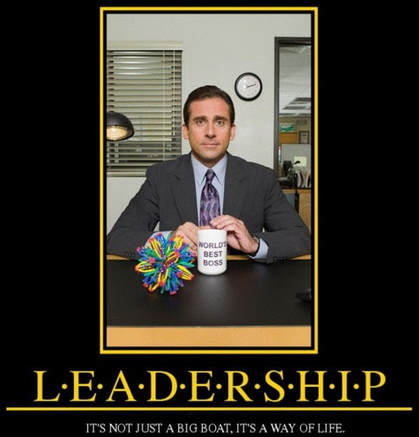 Like a boss. Like a boss. Leadership is assumed, appointed or affirmed, which is the most effective? If you are in the tens of people who have read more than one of these IZ Venture's articles, you will have noticed that we refer to leaders as “people in a position of leadership” or PIAPOL. We all have seen and been around leaders who rest upon their appointed position as a means to exert their authority as well as those who have assumed their position as a means to elevate their responsibility. Let’s take a stroll through the leadership landscape and sort out a few myths and dysfunctions with regards to this catch word - leadership. Whether you think you are or you think you aren’t [a leader], you are right. Being in a position of leadership does not mean that I am a leader, the working definition of a leader comes in the form of activity – if you look behind you and people are following, then you are a leader. Leadership can happen at any level and the proper means to promotion in positions of leadership come as an organization recognizes values in action on the part of an individual and merely formalizes their role as a positive influencer. Leadership isn’t about title or role, you and I can lead (or influence) from anywhere. As noted by author and speaker John C. Maxwell in his recent book The 360 Degree Leader, “Leadership is more disposition than position—influence others from wherever you are.” As such, effective leadership starts with leading yourself by clarifying your values, living them out consistently and establishing accountability for yourself through trusted peers. The value of influence is immeasurable and influence can be generated at any level. Everyone has some level of influence, either I am actively working to expand my influence or I am devaluing it by either keeping it quiet or using it poorly. What types of “leaders” are the most annoying, for me two come to mind, 1) the self-appointed leader (SAL) who constantly repeats statements or performs actions they consumed without any context, depth or usefulness and, 2) the appointed leader (AL) who is the reason we have terms like “the Peter principle” where they have been promoted beyond the point of their effectiveness but they are clueless to their shortcomings. The SAL can quote leader after leader, often really good choices, but they are missing the life experiences and the values that shaped the outlook of those they are quoting (more). The AL is one who has slipped through the organizational cracks because someone needed to be promoted, they are the status quo of leadership and they are a reflection of the reasons that so many companies are just getting by. Leadership grows as life gains experience through learning via success and [mostly] failures. Perspective is one area that we have the most control over and yet under-utilize. We cannot control what happens around us but we can control how we respond to it and what we learn from it. “The difference between a warrior and an ordinary man,” according to the author of The E-Myth, Michael E. Gerber, “Is that a warrior sees everything as a challenge, while an ordinary man sees everything as either a blessing or a curse.” As noted in the previous paragraph, leadership is neither assumed nor appointed, leadership is an action that is affirmed by those who are following. Those that assume leadership place themselves in a role that is irrelevant to those around them, they talk leadership but are guiding no one (more). Those that are appointed to leadership may have the benefit of organizational authority but in order to affect any real change they will need to earn the respect of those in their charge. In leadership, affirmation is much more powerful than assumption or appointment. Going back to where we started this conversation, another key myth or dysfunction with regards to leadership is that we discount or devalue the everyday leaders who make a difference without having a position or an ulterior motive. The power of everyday leadership, of simply doing good and leading by example, is missed by those screaming for attention to assume a role or those fighting for authority to maintain a position. Leadership creates clarity around vision and values, builds consistency in execution and develops a culture of accountability (Accountability? What's that?). If you have 6 minutes, take a listen to this TED Talk from Drew Dudley on the impact of Everyday Leadership.
1 Comment
|
AuthorThoughts on personal and professional development. Jon Isaacson, The Intentional Restorer, is a contractor, author, and host of The DYOJO Podcast. The goal of The DYOJO is to help growth-minded restoration professionals shorten their DANG learning curve for personal and professional development. You can watch The DYOJO Podcast on YouTube on Thursdays or listen on your favorite podcast platform.
Archives
March 2023
Categories
All
<script type="text/javascript" src="//downloads.mailchimp.com/js/signup-forms/popup/unique-methods/embed.js" data-dojo-config="usePlainJson: true, isDebug: false"></script><script type="text/javascript">window.dojoRequire(["mojo/signup-forms/Loader"], function(L) { L.start({"baseUrl":"mc.us5.list-manage.com","uuid":"b9016446bd3c6a9f0bd835d4e","lid":"83282ffb9e","uniqueMethods":true}) })</script>
|
Jon Isaacson |
Connect. Collaborate. Conquer.
© COPYRIGHT 2015. ALL RIGHTS RESERVED.
|



 RSS Feed
RSS Feed